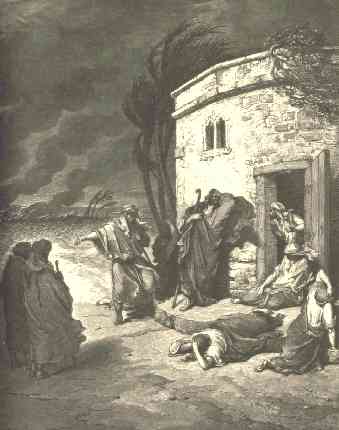
No, no, no I don't mean that kind of dessert.

Nope that's not the desert I'm referring to easier.
I'm bringing up desert here in it's philosophical context, i.e. the condition of deserving something, of meriting praise or blame based off an action performed or a property possessed. Specifically I want to discuss desert as it pertains to Christianity and religion as a whole.
Among my biggest ethical problems with Christianity (although let it be noted that this issue has it's roots squarely in Judaism) is that it severely misallocates both redemption and punishment to people who do not deserve it. My understanding of desert is that praise or blame can only be rightly administered to an individual if they are responsible for a certain praiseworthy or blameworthy action.
To put it a different way; agent X deserves Y if it is responsible for Z
Or for a real example; Jones deserves the five dollars that I agreed to pay him if he mows my lawn.
Now I hope that everyone agrees that Jones no longer deserves the five dollars if he is not responsible for mowing my lawns. Having your lawns mowed is a praiseworthy deed but the praise must go to the person responsible for it and to nobody else.
Given such a common sense understanding of desert I'm at a loss to account for all of the ridiculous violations of it in the Bible. Here are some examples.
1. In Genesis Adam and Eve sin by eating the forbidden fruit. God not only punishes them but the rest of humanity by bringing death into the world. The rest of humanity were not responsible for eating the fruit but they were apparently deserving of the punishment.
2. In Leviticus book four the practise of scapegoating is explained. Basically if you find that you have committed a sin you are to slaughter a bullock or a goat or a lamb as an offering to God and since something else has been punished on your behalf you are forgiven.
3. In 1 Kings 21 there's a king called Ahab who's quite keen on having a man's vineyard. He can't buy it off him so his wife has the owner stoned to death so that the king will be happy. In any case God takes exception to this business so he has his prophet Elijah promise that Ahab's sons will be punished. Before they even exist these sons are laden with undeserved punishment for a sin that they were not responsible for.
4. There are many such examples of people in the Old Testament being punished like the sons of Ahab. This next one is from the New Testament though and it's a biggie. Jesus gets crucified on a cross and the punishment that he endures absolves the faithful of their sins. I still can't see how Christians can swallow this one without some serious cognitive dissonance. Jesus is not responsible for the sins that he takes the punishment for and the faithful recieve redemption for an action that they are not responsible for. There's no sense in it.
Must Christianity forgo responsibility on an individual level in this way? How do the Christians here come to grips with this system of desert? Are there any other religons that have similar violations of desert?
In closing there is one particular passage from Deuteronomy that I absolutely must share, for it is of the utmost relevance to this topic. It's confusing to say the least given what I've just detailed.
Deuteronomy 24:16 "The fathers shall not be put to death for the children, neither shall the children be put to death for the fathers: every man shall be put to death for his own sin."

Log in to comment